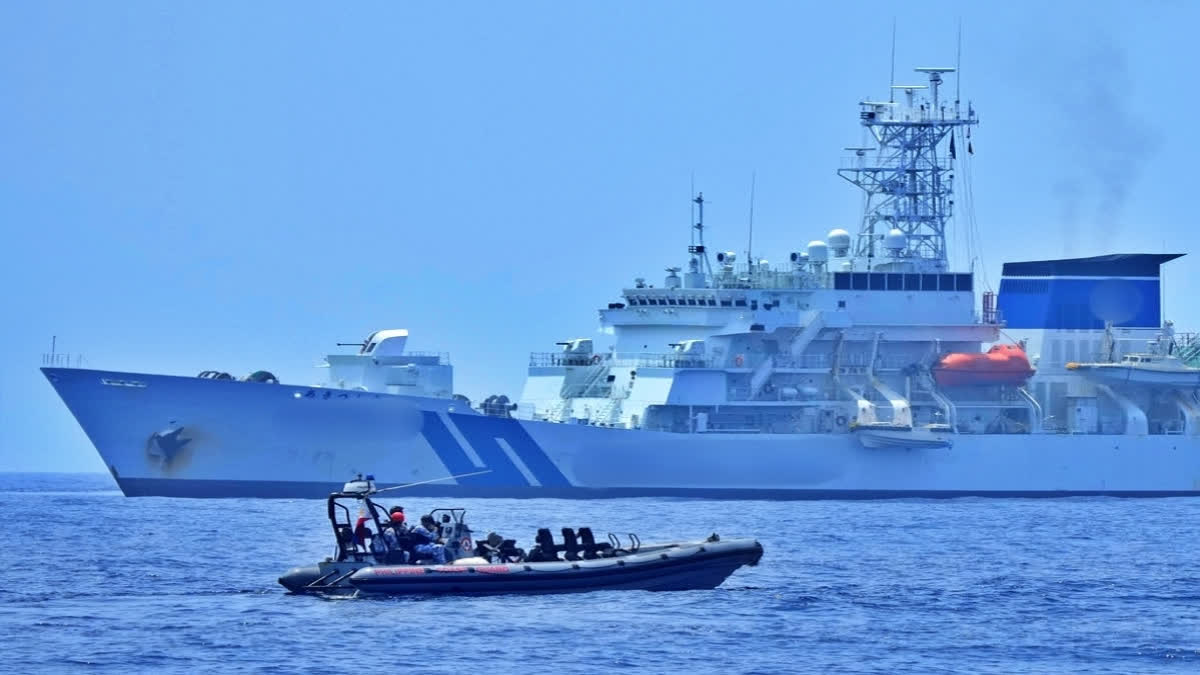New Delhi: Despite India’s repeated objections over Sri Lanka's approval of Chinese naval ships to enter its waters, another similar incident threatens to throw spanner in the bilateral relationship between two countries. A Chinese 'research' vessel was allowed to dock on the island nation’s ports, a move which India may see as Beijing's brazen effort to exert its influence over the Indian Ocean.
Also read: Advantage India: Philippines new security policy draws battle lines in South China Sea
According to reports in the Sri Lankan media, the country’s defence ministry has granted permission to the Shi Yan 6, claimed to be a research vessel, to enter its waters following a request by the foreign ministry and the National Aquatic Resources Research and Development Agency (NARA). The ship is expected to dock at Colombo port in October. The vessel sailing under the flag of China has a carrying capacity of 1,115 DWT. It is 90.6 metres long and 17 metres wide. According to China’s state broadcaster CGTN, the Shi Yan 6 is a scientific research vessel with a crew of 60 that carries out oceanography, marine ecology, and marine geology tests.
New Delhi has always protested to Colombo about the presence of Chinese naval ships in Sri Lankan waters as the area comes directly under India’s sphere of influence. Earlier this month too, a Chinese ship claiming to be a research vessel docked at Colombo port ostensibly for replenishments. The Hao Yang 24 Hao actually turned out to be a Chinese warship. The 129-metre-long ship is manned by a crew of 138 and is commanded by Commander Jin Xin.
When asked about it at a media briefing, External Affairs Ministry spokesperson Arindam Bagchi had said that the Indian government “carefully monitors any development having a bearing on India's security interests and takes all necessary measures to defend them”.
Last year too, India had strongly protested when a Chinese survey vessel called the Yuan Wang 5 was allowed to dock at the Hambantota port in Sri Lanka. Though the ship was described as a research and survey vessel, security analysts said that it was also packed with space and satellite tracking electronics that can monitor rocket and missile launches. The ship was given permission to dock by then President Gotabaya Rajapaksa a day before he fled the country in the in the midst of an economic crisis.
“China is trying to show its right to come to the Indian Ocean region,” Anand Kumar, Associate Fellow in the Manohar Parrikar Institute of Defence Studies and Analyses, told ETV Bharat. “It is trying to show its influence over the countries of the region.”
Kumar said this area has always been under India’s sphere of influence. “China is trying to intrude into this area. At the same time, China is making illegal claims over the waters of the South China Sea,” he said.
China is involved in a number of territorial disputes in the South China Sea with countries of Southeast Asia.During his visit to India last month, Sri Lankan President Ranil Wickremesinghe had tried to assuage New Delhi’s apprehensions about the presence of Chinese naval ships in his island nation’s waters. Wickremesinghe said that his country has adopted a new standard operating procedure (SOP) to determine what kind of military and non-military ships and aircraft will be allowed to visit the country. The SOP was adopted following a request by India but its details are not available in the public domain yet. The US too has been pressurising Sri Lanka not to allow Chinese naval ships in its waters due to security and strategic considerations.
Though Wickremesinghe claims that his country maintains an Asia-centric neutral foreign policy without getting involved in any major power rivalry, Colombo is compelled to maintain equally good relations with both New Delhi and Beijing due to external debt obligations and the economic crisis last year. But the fact of the matter is that Sri Lanka cannot afford to refuse China’s request for permission to allow its ships’ access to its waters because of Beijing’s huge investments in India’s southern neighbour.
India is part of a Quad that also comprises the US, Japan and Australia that is working for a free and open Indo-Pacific in the face of China’s hegemony in the region. That is why security in the Indian Ocean region has huge strategic implications. Not only for India, what Colombo does in terms of foreign policy and developments in Sri Lanka have wider implications for other major powers’ access to the Indian Ocean. It will be interesting to see how India responds to this latest development of Sri Lanka allowing another Chinese ship into its waters. Watch this space.



